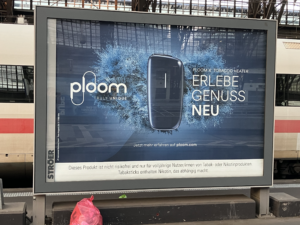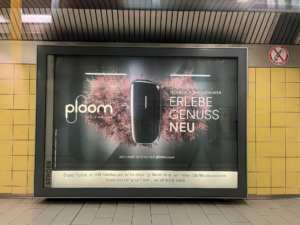Dr. Katrin Schaller
In Germany, the heated tobacco product (HTP) ‘Iqos’ from Philip Morris has been available since 2017 and ‘Glo’ from British American Tobacco since 2020. In May 2024, Japan Tobacco International (JTI) became the third tobacco company to launch its HTP ‘Ploom’ in Germany. When it was launched, Ploom was available online throughout Germany as well as in shops in four cities (Cologne, Düsseldorf, Bonn and Leverkusen).
Tobacco advertising on billboards in public spaces – except at the point of sale – has been banned in Germany since 2022. Since 2023, this has also applied to HTPs (German Tobacco Product Law). Despite the existing ban on outdoor advertising, JTI supported the Ploom launch in Cologne with an eye-catching billboard campaign from mid-May to mid-June in 2024, Figure 1 and Figure 2. In order to circumvent the advertising ban, only the heating devices were shown on the posters, but not the tobacco sticks which are to be used with the heating device. Thus, no tobacco product itself was visible on the billboards.
Figure 1. Outdoor advertising for Ploom in Cologne main railway station. The text says: Experience enjoyment in a new way. Find out more on ploom.com. This product is not risk-free and is only for adult users of tobacco or nicotine products. Tobacco sticks contain nicotine, which is addictive. Photo credit: Katrin Schaller
Figure 2. Outdoor advertising for Ploom in Cologne in an underground station. Photo credit: Ute Mons
In fact, without the tobacco sticks the heating device is without any function. The tobacco sticks to be used in the heating device were mentioned in a text note on the billboard: ‘This product is not risk-free and is only for adult users of tobacco or nicotine products. Tobacco sticks contain nicotine, which is addictive.’ This notice does not correspond to the legally mandated health warning on tobacco which says: ’This tobacco product is harmful to your health and is addictive.’ The billboards highlighted the product’s new taste and were placed in underground and railway stations, where many people of all ages can be targeted when using public transport.
Upon the advice of a tobacco control advocate, the city of Cologne investigated the legality of the Ploom advertising and concluded that this form of advertising is prohibited. As a result, the city asked the advertising companies responsible for the advertising space to remove the billboards. By July 2024, there were no more Ploom billboards in Cologne.
Even though the advertising ban was ultimately enforced, the advertising was very prominently visible in highly frequented locations for several weeks. As a result, the billboard advertising for Ploom was able to reach a huge audience, including young people.
This example from Germany clearly shows that the tobacco industry tries to circumvent advertising bans for HTPs by advertising only the heating device without showing the tobacco sticks. To avoid this loophole, countries should explicitly include the heating devices in advertising bans on HTPs.
Author
Dr. Katrin Schaller, German Cancer Research Center (DKFZ), Foundation under Public Law, Unit Cancer Prevention, Im Neuenheimer Feld 280, 69120 Heidelberg, Germany

